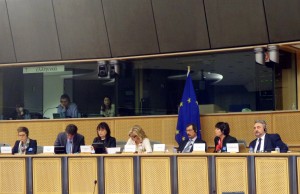Prove! calls on the European Parliament to make human rights a condition for partnership with Turkmenistan
 On May 6, Prove They Are Alive! member Yuri Dzhibladze, of the Moscow based Center for the Development of Democracy and Human Rights, called upon the European Parliament to delay its consent to a Partnership and Cooperation Agreement (PCA) with Turkmenistan until the country makes real and measurable progress in the sphere of human rights.
On May 6, Prove They Are Alive! member Yuri Dzhibladze, of the Moscow based Center for the Development of Democracy and Human Rights, called upon the European Parliament to delay its consent to a Partnership and Cooperation Agreement (PCA) with Turkmenistan until the country makes real and measurable progress in the sphere of human rights.
Speaking at the Subcommittee on Human Rights of the European Parliament, Dzhibladze highlighted ongoing enforced disappearances as one of the key human rights problems in the country, along with the absence of free and independent media, clampdown on independent civil society, restrictions on the freedom of movement, and systematic accounts of torture as part of a highly repressive political system. Further, the country remains closed to any independent human rights monitoring: “[a]t least nine UN special procedures remain unable to carry out country visits despite longstanding requests for access”, he noted.
Highlighting the fact that Turkmenistan needs access to European markets for the export of its gas, coupled with an increasingly unstable security situation at its borders, Dzhibladze accented this as a critical time for European influence. “All in all, we recommend that the Parliament postpones its consent to ratification [of the PCA], making it conditional on tangible progress in human rights, based on measurable benchmarks, and holds a review of progress in a short period of time – in 6 months or in one year. Prospect of ratification should be quite real and close in time to motivate the Turkmen government to take concrete steps,” he stated.
Recalling obligations under Article 21 of the Lisbon Treaty, he called upon active and principled engagement, “based on accountable and transparent relations, and for consistent and coherent policy where human rights are not sidelined but are treated on equal basis with energy security and other legitimate interests of the European Union and where effective leverage is used to push for positive change.”
Full video coverage of the session can be found here ( Dzhibladze’s remarks start at min 40:00.)
